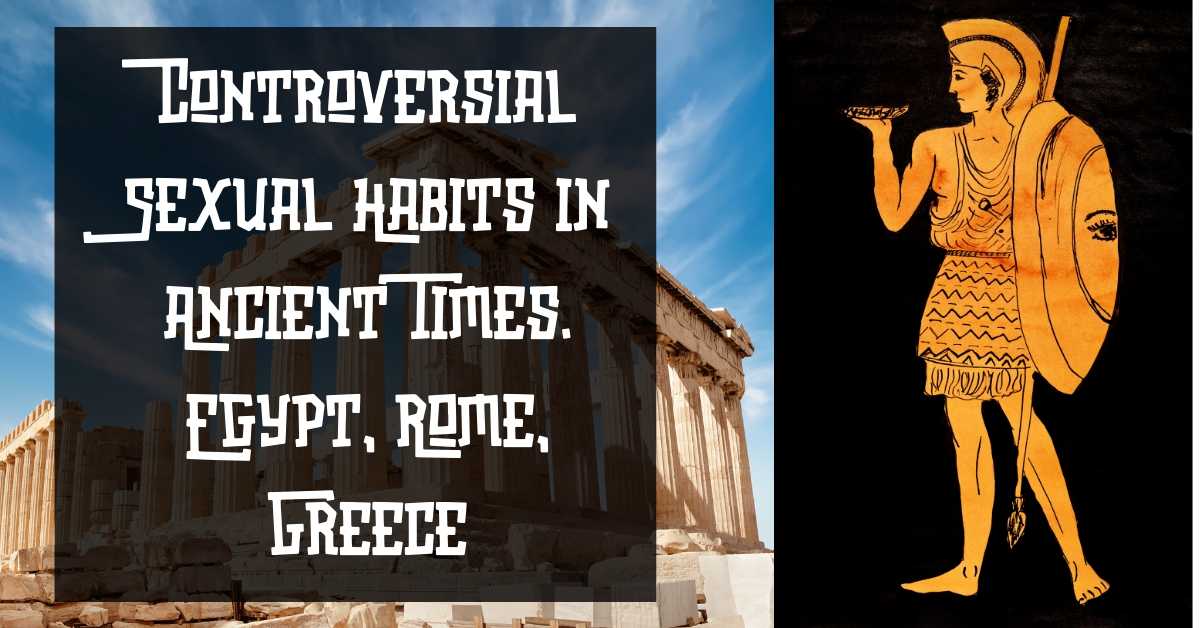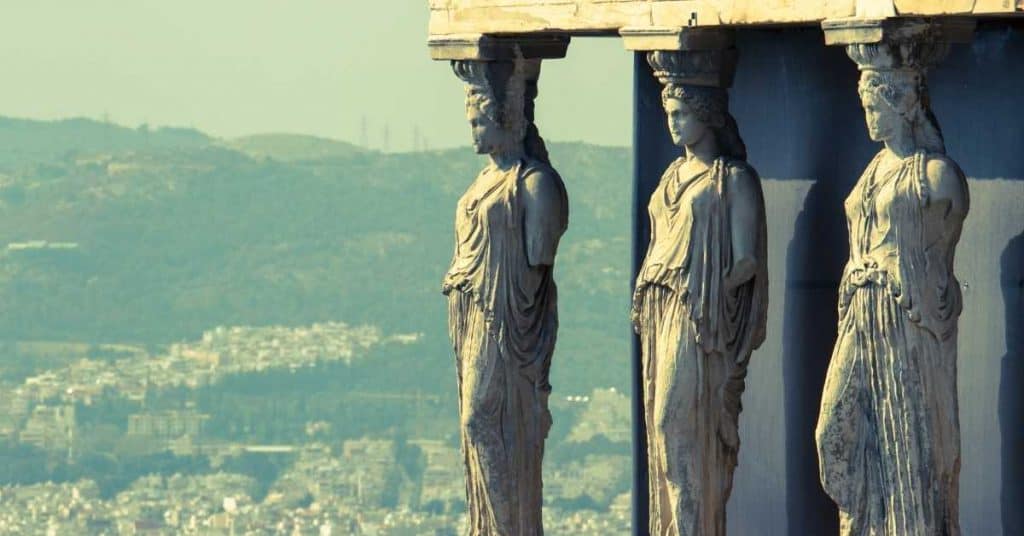Controversial Sexual Habits in Ancient Times. Egypt, Rome, Greece

Incest, homosexuality, pedophilia and sexual orgies are controversial practices in modern society, some of them being forbidden by law – for example, incest and pedophilia.
Thousands of years ago, however, the sexual habits were considered something natural, and those that rejected these ideas would have been regarded with reluctance and disdain, just like are seen today the ones who practice them.
1. Rising to power through incest (Egypt)
Incest, that intimate relationship between first-degree relatives, is now prohibited by law, but in the past, it has been a widespread practice, especially in royal families. As examples, we can take Ancient Egypt, Peru during the Inca Empire, and, in some periods, Thailand, Mexico, and Central Africa.
Let us not forget that this phenomenon is even mentioned in the Bible, in the story of Lot, where he “unites” with his daughters.
Over time, intimate relationships within the family were only allowed between cousins, observing the apparent health problems in children born to related parents. The best-known example of this is probably King Charles II of Spain, the last of the Habsburg dynasty, who died in 1700. He had a clear handicap, he could not speak until he was four, or walk until the age 8.
Beyond the moral issue that arises is obvious health risk of their offspring. Those who inherit too similar genes from their parents (like the brother and sister) have a much higher risk of receiving a defective recessive gene.
In the past, however, no one knew of this risk and incest seem a handy solution to keep the unity of the tribe or power within a family.
Thus, in ancient Egypt, the duty and privilege was incest in the royal family. It all started from Egyptian mythology, the gods married their sisters. The best example is of Osiris, who had a child with his sister, Isis. This child was called Horus and the likeness of a hawk became the symbol and protector of the pharaoh.
Following the example of the gods, the pharaoh was required to marry his sister, it was the only way to be considered a legitimate ruler. Wealth and power remained in the family. In Egyptian society, the right to the throne was passed on to the older daughter, although usually women never reach the pharaoh status, it is only subject to their husband and brother.
The famous Cleopatra, known for her amorous relationships with Julius Caesar and Marc Antony, was forced by tradition to marry first with her brothers Ptomeleu XIII and Ptolemy XIV afterward.
Cleopatra’s parents were still brother and sister, as well as the parents of Tutankhamun. The teenage pharaoh’s mummy was discovered, with the help of DNA testing, his grandparents and parents were identified. In turn, when he was 10, he married his sister Ankhesenpaaten.
Many generations of incestuous relationships took place. Egyptologists who have studied the mummy of Tutankhamun have observed that he was a very sickly child, suffering from malaria, likely have very fragile bones, and was forced to walk using a cane.
His sister lost two pregnancies, the children were born dead, probably also because of these problems caused by links within the same family.
Most times, historians believe, if these incestuous marriages there was no question of romantic love or sexual attraction between the two. The union was committed for political, religious or simply to follow a tradition.

2. “Platonic Love” and pedophilia in Ancient Greece
The same can not be said about homosexual relationships in ancient Greece. We speak particularly about the flourishing period of this ancient civilization, Plato’s era when men did not hesitate to show, even in public, the passion for other men.
This habit was found revolting by the Romans when they were part of the great Greek empire. They used as a term for homosexuality, the phrase “Greek habit” and believed that these practices have been born because of the special interest of the Greeks for sports, for athletes, they always appeared completely naked.
Greek legends are full of stories of love between men. Even the Gods had these passions, they often kidnap, besides beautiful maidens, attractive guys as well, like Ganymede. The friendship between Achilles and Patroclus, heroes of the Trojan War, can also be interpreted, although Homer has not shown that they had intimate relationships.
Although there were laws to punish homosexuality, especially in Sparta and Athens, where slaves called “teachers” were meant, among other things, to protect the boys of unwanted advances.

Attitudes towards homosexuality in Greek society have seen many changes. At one time, this type of relationship was considered similar to Platonic love, spiritual, without sexual connotations, therefore higher love that can exist between a man and a woman. However, some texts by Solon, Aeschylus, and Theocritus talk more about sensual love between men, far from pure and spiritual.
Ties involving homosexual usually older men and adolescents. Hence the term pederast – from paiderastia – which means love for the boys.
Older men (erastes) had to assure the boy (eromenos) education, to protect him, show him affection and be a true model to follow. There is thus a real social code and the relationship shape after a long courtship of the boy, who wanted to be sure of the adults’ sincere feelings.
The relationship usually begins when the boy was 12 years old and continued until he was considered a man, the moment when he grew a beard and body hair.
Homosexual relations between adults were blamed, because, according to the social code, the passive person had to be young and adults who took this role where despised.
3. Unrestrained libertinism for the “Citizens of Rome”
In ancient Greece, women’s role was reduced to that of making babies and thus ensure offspring for her husband. The same role for a woman was seen in Roman society. She had to respect the pudicitia, a complex moral value who appealed to modesty, chastity, and love for one man.
Only the wealthy families were receiving education, but even they must be subject to their husband and father and then limit their social life to raising children.
Men had more freedom. They could have sex outside of marriage, and satisfying those desires with prostitutes or slaves. Anyone could sexually abuse a slave, they were considered property, not people, and as long as the owner does not file a complaint about damages, slaves had no rights, not even to their own body.

Prostitution was legal, brothels existed, but women working here, even if they were free, not slaves, lost their social status, becoming an infamis. In this category, there were also included actors, gladiators, and dancers, people who earned their living by entertaining the people of Rome.
Even though the men of Rome often sought refuge in extramarital affairs, they seemed not to be a prude at home. Bedroom walls of the old Roman houses are full of frescoes showing scenes of explicit sex, downright pornographic.
Homosexual men have accepted only an inferior social status. And in this case, as in ancient Greece, which was a passive partner became despicable, being considered effeminate, while the man who had the active role was criticized as a vrreun. Male prostitution was prohibited until the third century CE, and 100 years later the practice was punishable by death.
In Pompeii and Herculaneum there were so-called private sex clubs. They were actually separate rooms in large villas owned usually by rich respectable people.
These rooms were decorated like a brothel with pornographic frescoes and had a separate entrance to the house, so visitors do not disturb the villa owners. At these erotic parties, public figures were taking part and even prostitutes.

Source: National Geographic, Scientific American, Daily Mail, The Guardian, Huffington Post





